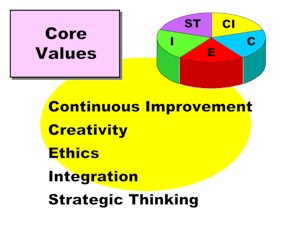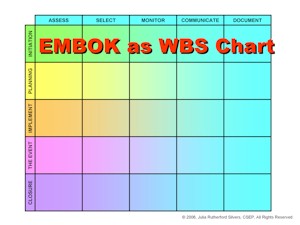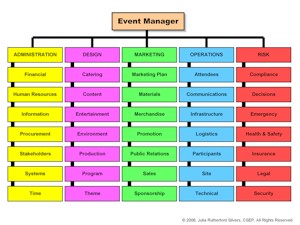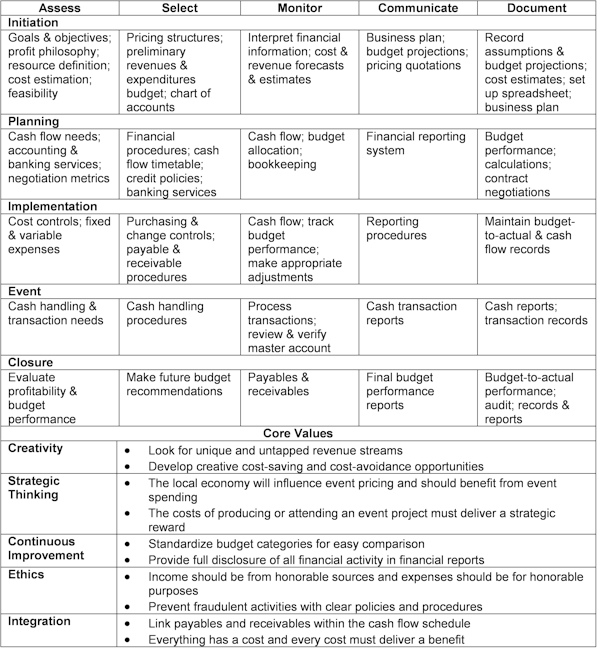|
 |
The four major facets of the EMBOK include the Phases, Processes, Core
Values, and Knowledge Domains. Taken together these represent the scope
of events management and provide the primary categories for a
classification system or
management system. |
|
 |
The Phases
illustrate the sequential nature of event management, highlighting the
criticality of time in any event project. The phases include initiation,
planning, implementation, the event, and closure, and are derived from
traditional project management terminology. |
|
 |
The Processes
illustrate both a sequential and iterative system
that promotes a comprehensive course of action as well as a dynamic
approach to the changing nature of events. The Processes include
assessment, selection, monitoring, communication, and documentation, and
are based on widely-accepted process systems.
|
|
 |
The Core Values
specify those principles that must be infused throughout all decisions
regarding every element, phase, and process of an event to ensure these
decisions facilitate successful and sustainable outcomes. No hierarchy
of importance is implied; they are all equally vital to excellence in
events management. |
|
 |
The Domains
represent the overarching areas of activity or functions within events
management. They illustrate the full scope of the responsibilities
assigned to event organizers as well as categories suitable for an
organizational structure or effective knowledge management. Note that
these are organized alphabetically, again without any implied hierarchy
or sequential application.
|
|
ADMINISTRATION |
DESIGN |
MARKETING |
OPERATIONS |
RISK |
|
Financial
- Budgets
- Costing & Pricing
- Cash Flow Management
- Accounting |
Catering
- Menu Selection
- Service Style
- Alcohol Management
- Catering Operations |
Marketing Plan
- Plan Development
- Target Markets
- Messages/Media
- Customer/Guest
Relations |
Attendees
- Registration/Ticketing
- Admittance Controls
- Movement & Traffic
Flow
- Crowd Management |
Compliance
- Statutes & Regulations
- Accessibility
- Property Rights
- Compliance Instruments |
|
Human Resources
- Organizational
Structure
- Workforce Relations
- Volunteers
- Employment Legalities |
Content
- Communication
Objectives
- Educational
Obligations
|
Materials
- Promotional Materials
- Collateral Materials
- Design & Production
- Delivery
|
Communications
- Internal/External
Modes
- Equipment & Protocols
- Briefing & Debriefing
- Production Book |
Decision Mgmt.
- Decision Framing
- Resources & Criteria
- Deliberation &
Collaboration
- Authority &
Empowerment |
|
Information
- Information
Acquisition
- Distribution & Control
- Documentation
- Record Keeping |
Entertainment
- Sourcing & Selection
- Entertainer
Requirements
- Entertainer Controls
- Ancillary Programs
|
Merchandise
- Product Development
- Brand Management
- Manufacture
- Distribution |
Infrastructure
- Transportation &
Parking
- Utilities
- Waste Management
- Sanitation Services |
Emergency Mgmt.
- Medical Services
- Evacuations
- Crisis Management
- Disaster Management |
|
Procurement
- Solicitation Documents
- Source Selection
- Change Controls
- Contract
Administration |
Environment
- Décor & Furnishings
- Site Layout
- Wayfinding
- Learning Environments |
Promotions
- Advertising
- Promotional Events
- Cross Promotions
- Contests/Giveaways |
Logistics
- Task Sequencing
- Contractor
Coordination
- Equipment & Materiel
- Move-In/Out &
Maintenance |
Health & Safety
- Fire Safety
- Occupational Safety
- Health & Welfare
- Crowd Behavior &
Control |
|
Stakeholders
- Client Management
- Constituency
Management
- Participants/Providers
- Communications |
Production
- Lighting
- Sound
- Visual Presentations
- Special Effects |
Public Relations
- Image Management
- Media Relations
- Publicity
- Crisis Management |
Participants
- Speakers & Performers
- Celebrities &
Dignitaries
-
Athletes/Coaches/Referees
- Officials/Experts |
Insurance
- Loss Prevention
- Liability
- Coverage Requirements
- Policy Management |
|
Systems
- Database Systems
- Knowledge Management
- Accountability Systems
- Technology |
Program
- Agenda Choreography
- Activities &
Attractions
- Ceremonial
Requirements
- Amenities &
Hospitality |
Sales
- Ticketing Operations
- Sales Platforms
- Concessions
- Cash Handling |
Site Management
- Site Sourcing &
Inspection
- Site Selection &
Contracting
- Site Planning
- Site Development |
Legal
- Contracts &
Negotiation
- Licenses & Authority
- Policies & Procedures
- Ethics |
|
Time Management
- Activity Architecture
- Timelines
- Production Schedules
- Schedule Controls |
Theme
- Purpose & Message
- Cultural Iconography
- Image & Branding
- Theme Integration
|
Sponsorship
- Sponsors & Donors
- Benefits Packaging
- Solicitation
- Servicing Sponsors |
Technical Production
- Staging & Equipment
- Installation
- Operation
- Technicians |
Security
- Personnel
- Equipment
- Deployment
- Command & Control |












